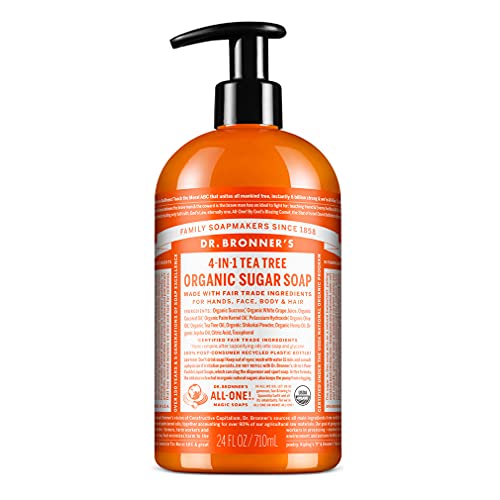
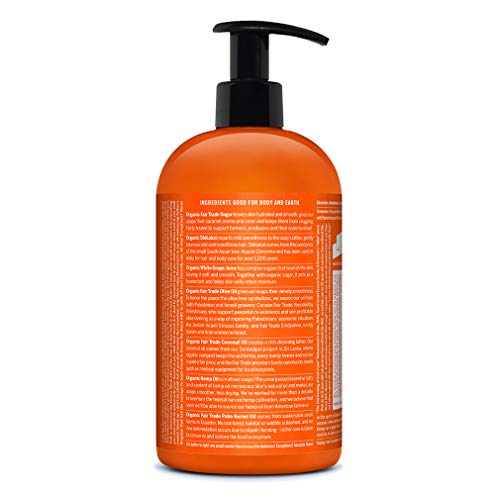
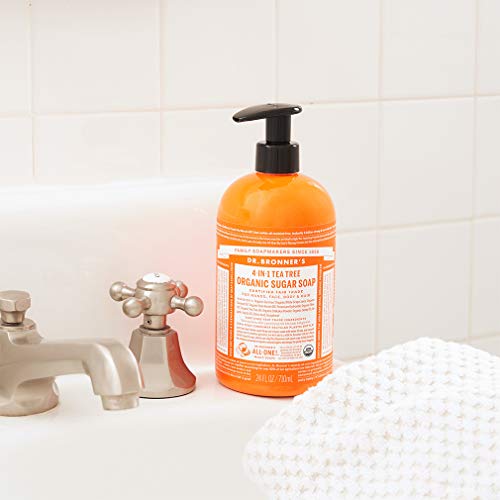
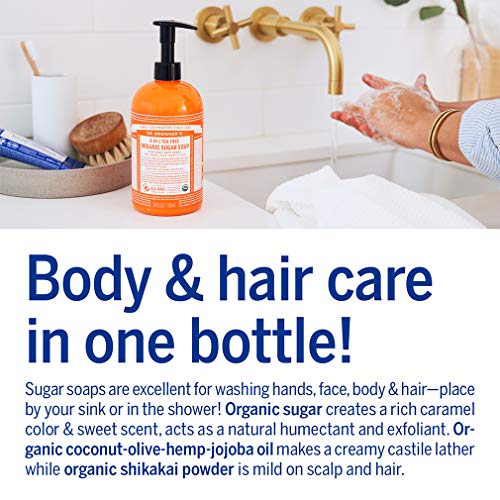
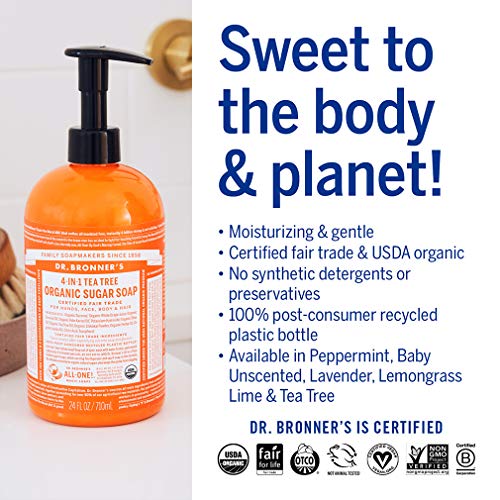
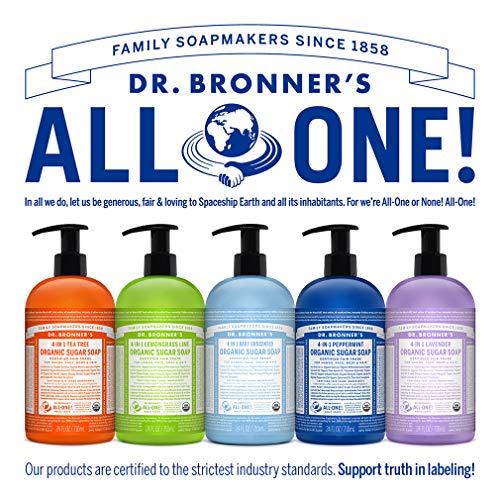
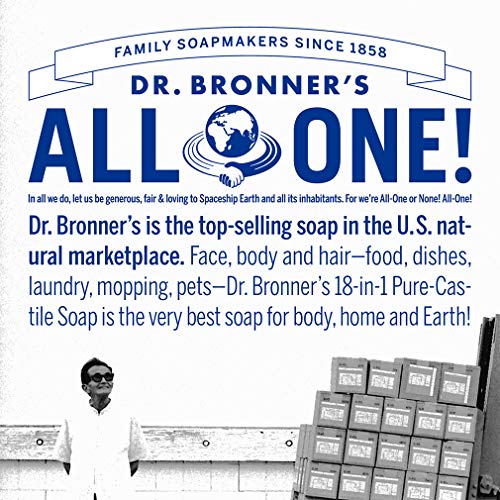
Dr. Bronner's Organic Sugar Soap - Cleanses & Nourishes with Fair Trade Ingredients - 24oz


Cannabis Sativa (Hemp) Extract
High RiskCannabis sativa (hemp) extract is derived from the hemp plant, primarily used for its potential therapeutic properties. It contains various cannabinoids, flavonoids, and terpenes, which may contribute to its functional benefits in cosmetic and wellness products. The extract is often sought for its calming and anti-inflammatory effects.
Sustai Insights
Cannabis sativa (hemp) extract offers functional benefits such as anti-inflammatory properties and potential skin-soothing effects. It is derived from sustainably sourced hemp, contributing to its appeal. However, there are health risks associated with its use, including low concerns for carcinogenicity and neurotoxicity. Regulatory restrictions exist in certain jurisdictions, marking it as high risk overall. Safe usage should be practiced, particularly in sensitive applications, and alternatives like hemp seed oil may be considered for specific uses.
Potassium Hydroxide
High RiskPotassium hydroxide is a caustic inorganic base commonly used in various products for its ability to adjust pH levels and act as a cleaning agent. It is highly soluble in water and can produce heat upon dissolution, making it effective in certain formulations.
Sustai Insights
Potassium hydroxide serves as a strong pH adjuster and cleaning agent, but it poses significant health risks due to its caustic nature, which can cause irritation to skin and eyes. Environmental concerns include its potential to contribute to water pollution. Regulatory bodies have imposed strict usage restrictions due to these hazards, leading to a high-risk overall assessment. Safe handling practices are essential, and alternatives such as citric acid may provide safer pH adjustment without the associated risks.
Citric Acid
Medium RiskCitric acid is an alpha hydroxy acid used in personal care products primarily for its role as a pH adjuster and natural preservative. It occurs naturally in citrus fruits and is commonly utilized in various formulations for its chelating properties and mild exfoliation benefits.
Sustai Insights
Citric acid offers functional benefits as an effective preservative and pH stabilizer, contributing to product longevity and stability. It is biodegradable and derived from renewable sources. Health risks are low, with minimal concerns regarding carcinogenicity, allergies, and reproductive toxicity. However, moderate use restrictions exist due to potential irritation at high concentrations. Environmental risks are limited, as citric acid is not known to accumulate in ecosystems. Regulatory agencies have no significant advisories against its use. Overall, it is assessed as a medium-risk ingredient, with safe usage practices recommended and alternatives available.
Simmondsia Chinensis (Jojoba)
Low RiskSimmondsia chinensis, commonly known as jojoba, is an oil derived from the seeds of the jojoba plant. It is commonly used in cosmetic formulations for its moisturizing properties, acting as an emollient and skin conditioning agent.
Sustai Insights
Jojoba oil offers functional benefits such as effective skin moisturization and is biodegradable, with sustainable sourcing practices. Health risks are low, with minimal concerns regarding carcinogenicity, allergies, and reproductive toxicity. Environmental impact is negligible, with no pollutant or bioaccumulation potential. Regulatory status is favorable with no significant restrictions noted. Overall, it is assessed as low risk, and safe usage practices should be maintained. Alternatives include other plant-derived oils like argan or almond oil, which may provide similar benefits.
Cocos Nucifera (Coconut) Oil
Low RiskCocos Nucifera (Coconut) Oil is derived from the kernels of the coconut palm. It is primarily used in cosmetic formulations for its emollient and moisturizing properties, making it suitable for skin and hair care products.
Sustai Insights
Coconut oil serves as an effective moisturizer and emollient, promoting skin hydration and softness. It is sustainably sourced and biodegradable. Health risks are minimal, with low concerns regarding carcinogenicity, allergens, and reproductive toxicity. Environmental impact is also low, as it does not contribute significantly to pollution or bioaccumulation. Regulatory bodies have not issued restrictions on its use. Overall, coconut oil presents a low risk for health and environmental concerns, making it a safe ingredient in cosmetic products.
Tocopherol, D Alpha
Low RiskTocopherol, specifically d-alpha tocopherol, is a naturally occurring form of Vitamin E. It is commonly used in cosmetic and personal care products primarily for its antioxidant properties, helping to protect formulations from oxidation and extend shelf life.
Sustai Insights
D-alpha tocopherol provides effective antioxidant benefits, contributing to product stability. It is sustainably sourced and generally regarded as safe, with low concerns regarding carcinogenicity, allergies, and reproductive toxicity. However, there are minor concerns about endocrine disruption. Regulatory bodies have not imposed significant restrictions, indicating low overall risk. Recommended usage practices include adhering to established safe concentration thresholds. Alternatives, such as other forms of Vitamin E or plant-based antioxidants, may also be considered.
Melaleuca Alternifolia (Tea Tree)
Low RiskMelaleuca alternifolia, commonly known as tea tree, is an unspecified preparation derived from the leaves of the tea tree. It is primarily used for its antiseptic properties and is found in various personal care products.
Sustai Insights
Tea tree oil offers functional benefits such as antimicrobial properties, making it effective in skincare formulations. It is considered to have low health risks, including low concerns for carcinogenicity, allergies, and reproductive toxicity. Environmental risks are minimal, with no significant pollutant or bioaccumulation potential. Regulatory bodies have noted no major advisories, and overall risk assessment remains low. For safe usage, it is recommended to use appropriate concentrations and consider alternatives like lavender or eucalyptus oil for similar benefits.
Simmondsia Chinensis (Jojoba)
Low RiskSimmondsia chinensis, commonly known as jojoba, is an oil derived from the seeds of the jojoba plant. It is commonly used in cosmetic formulations for its moisturizing properties, acting as an emollient and skin conditioning agent.
Sustai Insights
Jojoba oil offers functional benefits such as effective skin moisturization and is biodegradable, with sustainable sourcing practices. Health risks are low, with minimal concerns regarding carcinogenicity, allergies, and reproductive toxicity. Environmental impact is negligible, with no pollutant or bioaccumulation potential. Regulatory status is favorable with no significant restrictions noted. Overall, it is assessed as low risk, and safe usage practices should be maintained. Alternatives include other plant-derived oils like argan or almond oil, which may provide similar benefits.
Cocos Nucifera (Coconut) Oil
Low RiskCocos Nucifera (Coconut) Oil is derived from the kernels of the coconut palm. It is primarily used in cosmetic formulations for its emollient and moisturizing properties, making it suitable for skin and hair care products.
Sustai Insights
Coconut oil serves as an effective moisturizer and emollient, promoting skin hydration and softness. It is sustainably sourced and biodegradable. Health risks are minimal, with low concerns regarding carcinogenicity, allergens, and reproductive toxicity. Environmental impact is also low, as it does not contribute significantly to pollution or bioaccumulation. Regulatory bodies have not issued restrictions on its use. Overall, coconut oil presents a low risk for health and environmental concerns, making it a safe ingredient in cosmetic products.
Citric Acid
Medium RiskCitric acid is an alpha hydroxy acid used in personal care products primarily for its role as a pH adjuster and natural preservative. It occurs naturally in citrus fruits and is commonly utilized in various formulations for its chelating properties and mild exfoliation benefits.
Sustai Insights
Citric acid offers functional benefits as an effective preservative and pH stabilizer, contributing to product longevity and stability. It is biodegradable and derived from renewable sources. Health risks are low, with minimal concerns regarding carcinogenicity, allergies, and reproductive toxicity. However, moderate use restrictions exist due to potential irritation at high concentrations. Environmental risks are limited, as citric acid is not known to accumulate in ecosystems. Regulatory agencies have no significant advisories against its use. Overall, it is assessed as a medium-risk ingredient, with safe usage practices recommended and alternatives available.
Cannabis Sativa (Hemp) Extract
High RiskCannabis sativa (hemp) extract is derived from the hemp plant, primarily used for its potential therapeutic properties. It contains various cannabinoids, flavonoids, and terpenes, which may contribute to its functional benefits in cosmetic and wellness products. The extract is often sought for its calming and anti-inflammatory effects.
Sustai Insights
Cannabis sativa (hemp) extract offers functional benefits such as anti-inflammatory properties and potential skin-soothing effects. It is derived from sustainably sourced hemp, contributing to its appeal. However, there are health risks associated with its use, including low concerns for carcinogenicity and neurotoxicity. Regulatory restrictions exist in certain jurisdictions, marking it as high risk overall. Safe usage should be practiced, particularly in sensitive applications, and alternatives like hemp seed oil may be considered for specific uses.
Tocopherol, D Alpha
Low RiskTocopherol, specifically d-alpha tocopherol, is a naturally occurring form of Vitamin E. It is commonly used in cosmetic and personal care products primarily for its antioxidant properties, helping to protect formulations from oxidation and extend shelf life.
Sustai Insights
D-alpha tocopherol provides effective antioxidant benefits, contributing to product stability. It is sustainably sourced and generally regarded as safe, with low concerns regarding carcinogenicity, allergies, and reproductive toxicity. However, there are minor concerns about endocrine disruption. Regulatory bodies have not imposed significant restrictions, indicating low overall risk. Recommended usage practices include adhering to established safe concentration thresholds. Alternatives, such as other forms of Vitamin E or plant-based antioxidants, may also be considered.
Potassium Hydroxide
High RiskPotassium hydroxide is a caustic inorganic base commonly used in various products for its ability to adjust pH levels and act as a cleaning agent. It is highly soluble in water and can produce heat upon dissolution, making it effective in certain formulations.
Sustai Insights
Potassium hydroxide serves as a strong pH adjuster and cleaning agent, but it poses significant health risks due to its caustic nature, which can cause irritation to skin and eyes. Environmental concerns include its potential to contribute to water pollution. Regulatory bodies have imposed strict usage restrictions due to these hazards, leading to a high-risk overall assessment. Safe handling practices are essential, and alternatives such as citric acid may provide safer pH adjustment without the associated risks.
Melaleuca Alternifolia (Tea Tree)
Low RiskMelaleuca alternifolia, commonly known as tea tree, is an unspecified preparation derived from the leaves of the tea tree. It is primarily used for its antiseptic properties and is found in various personal care products.
Sustai Insights
Tea tree oil offers functional benefits such as antimicrobial properties, making it effective in skincare formulations. It is considered to have low health risks, including low concerns for carcinogenicity, allergies, and reproductive toxicity. Environmental risks are minimal, with no significant pollutant or bioaccumulation potential. Regulatory bodies have noted no major advisories, and overall risk assessment remains low. For safe usage, it is recommended to use appropriate concentrations and consider alternatives like lavender or eucalyptus oil for similar benefits.
Discover the rejuvenating power of Dr. Bronner's Organic Sugar Soap in Tea Tree scent. This 24-ounce body soap blends organic oils, sugar, and shikakai powder for a refreshing cleanse that nourishes your skin and hair while being kind to the planet.
- USDA Organic & Fair Trade Ingredients: Made with organic sugar and shikakai powder, this soap hydrates and smooths your skin, supporting fair trade practices that uplift local farmers.
- Versatile & Multi-Use: Enjoy the 4-in-1 functionality for hands, body, face, and hair, making it a perfect addition to any bath or kitchen routine.
- Natural Nourishment: Organic shikakai powder conditions and cleanses with a low pH, ensuring it’s gentle on your scalp and skin for a soft touch.
- Sustainable Practices: Crafted with organic and fair trade palm kernel oil, harvested sustainably to protect local ecosystems and empower communities.
- Eco-Friendly Packaging: Packaged in 100% post-consumer recycled plastic bottles, Dr. Bronner's is committed to reducing waste and promoting environmental responsibility.
Subscribe & Save with Sustai
- Best Price Guarantee: Always enjoy the lowest prices on sustainable home essentials.
- No Surprises: We’ll notify you before shipping. No hidden fees, ever.
- You’re in Charge: Change, pause, or cancel your subscription anytime with ease.
- Eco-Friendly Deliveries: Our grouped shipments mean less packaging and lower emissions.
Join us on a sustainable journey. Special offers for a limited time! Prices and promotions may change.
Recommended Products
Discover the rejuvenating power of Dr. Bronner's Organic Sugar Soap in Tea Tree scent. This 24-ounce body soap blends organic oils, sugar, and shikakai powder for a refreshing cleanse that nourishes your skin and hair while being kind to the planet.
- USDA Organic & Fair Trade Ingredients: Made with organic sugar and shikakai powder, this soap hydrates and smooths your skin, supporting fair trade practices that uplift local farmers.
- Versatile & Multi-Use: Enjoy the 4-in-1 functionality for hands, body, face, and hair, making it a perfect addition to any bath or kitchen routine.
- Natural Nourishment: Organic shikakai powder conditions and cleanses with a low pH, ensuring it’s gentle on your scalp and skin for a soft touch.
- Sustainable Practices: Crafted with organic and fair trade palm kernel oil, harvested sustainably to protect local ecosystems and empower communities.
- Eco-Friendly Packaging: Packaged in 100% post-consumer recycled plastic bottles, Dr. Bronner's is committed to reducing waste and promoting environmental responsibility.

You can have at most 2 Sustainable Steals products in your cart
Customer Reviews
Customers’ View
Customers appreciate the effectiveness and nourishing qualities of Dr. Bronner's Organic Sugar Soap, noting its ability to cleanse well while being gentle on the skin and hair. Many highlight that it keeps their skin clear and soft, with some users experiencing relief from eczema, stating, 'This soap helped my eczema so much!' The product's eco-friendly credentials, including its organic and fair trade ingredients, resonate with health-conscious consumers. Although there are mixed feelings about the scent, with some enjoying the fresh tea tree aroma and others finding it less favorable, overall feedback emphasizes the soap's moisturizing properties and gentle formulation. Despite some concerns regarding dryness and stickiness, customers find this product effective and aligned with their sustainable lifestyle.
AI-generated from the text of customer reviewsThis product has no reviews yet.






